| Zeitschrift Umělec 2004/2 >> You’ll Never See This Show | Übersicht aller Ausgaben | ||||||||||||
|
|||||||||||||
You’ll Never See This ShowZeitschrift Umělec 2004/201.02.2004 Jeffrey A. Buehler | en cs |
|||||||||||||
|
Redas Diržys: Let’s Be Part of the System!
Town hall tower, Bílina, 30. 4.–30.5. 2004 Redas Diržys’ most recent exhibition, Let’s Be Part of the System!, opened on April 31, 2004, on the eve of Czech entry to the European Union, and it never stood a chance of being noticed. After all, the venue was a town hall tower in the village of Bílina, out on the fringes of the northern Czech borderlands. For this date in time, nowhereville. The building looked like a needle-thin lighthouse caught in the gurgling trench of two waves that ran full force into one another. Up on the surface, in distant cities, in the real world, there were fireworks and dancing. While down below, the artist was patiently, with great focus and attention, driving his drill into the concrete floor of the tower, using patterned holes to create the face of Linas Ryškus, Lithuanian media mogul, and on the wall — Pol Pot, Lukashenko.... Who was going to stop him? Maybe a better question is: Why would anyone stop him? This was Redas Diržys, the bearish artist and art school teacher from Lithuania, shimmering with irony, becoming a part of the system, his attempt to make contact with the world at large. We were out on the border of the Czech Republic and Germany, nowhere near the big shows in Prague, Berlin, Brussels, and Diržys was on his knees every night for a week etching his newspaper blowup into the floor. One night, the artist drilled with so much enthusiasm, with such gusto and inspiration, that the tower itself picked up the tremble and began to vibrate uncontrollably around him. Sometime around midnight, as the dust jetted from the bit, filling the air, two local police officers suddenly kicked in the door, guns drawn, sweat pouring down their faces. Fearless upholders of the system. Friend or foe? Nobody had informed the police, or so it seemed, that Diržys was heading with a head full of steam straight into the heart of the system, truce flags waving — on the very night that Europe took its next decided step towards becoming one. The police were never warned, apparently, that they had nothing to fear from a mad man with a drill out of the borders of representation, on the brink of collapsing from his life-long battle with the Lithuanian breed of bureaucracy. The artist had turned in his pen and tongue for a drill and he was making faces on the floor, walls, smiling Lukashenkos and peacefully deceased Pol Pots. In effect, Diržys was turning himself into the bridge by which Europe could struggle toward its ultimate Union: He was bringing home Europe’s native sons. The moment the door was kicked in, the artist raised his drill (in salutation? in self-defense? in a sudden surge of power?) and began to rev it. The uniformed men gaped down at the sight, too frightened to do anything, and he began to laugh like a lunatic, powering the drill in his hand up into the air like it was a pistol at an Iraqi wedding party. Diržys’ drilling projects go way back, all the way to 1997, when Alexander Lukashenko began appearing regularly in the newspapers and the artist began collecting them. The seeds for his collaborations with the “system” go all the way back to his residence stay in New York, when he met Czech artist Martin Zet. That was the moment Diržys describes as defining. Zet’s influence on him (and vice-versa) was nearly total. He returned to Lithuania with new inspiration, a new way of looking at his world, and the constructs that formed it. He no longer rejected anything, or remained a step outside, and this period finally culminated with the question: “How to be part of the system, and how to rebel at the same time.” He set about working with the material he knew best: art bureaucracy. “What are the basic features of the ordinary art bureaucrat? He/she always emphasizes the role and importance of the institution he/she belongs to. Always presents a well-elaborated mission and vision of the art institution. Clearly articulates the task of the international collaboration of institutions. Knows the definitions well and usually uses them to hide their meaning. Has good taste. Is politically correct. Always mentions cocktail parties held for a limited number of people and namedrops the big stars he/she knows. The bureaucrat maintains the hierarchy of the system. The bureaucrat believes that the institution protects him/her from responsibility.”1 In this case, the artist offers a very effective weapon against such bureaucracy, an artistic atom bomb that carries with it a suggestion of what could ultimately tear down the world’s real walls and borders: “sincerity, honesty, the depiction of doubt.” But this must be done while using the same bureaucratic forms of social appearance. In this way, the system falls into a trap of its own making, and becomes unmade. You’ll never see this show because it’s gone, only I had the sneaking suspicion when I was there that it was never meant to be seen (except maybe in the newspapers). That it itself was just a lone bleep on the art screen as two systems, East and West, came together with not a boom, but a slow aching wheezing sound. But in case you’re interested, Ryškus’ mug is still on the floor of Bílina’s Town Hall, and they’ve promised to keep it. So if you can make the trip, come participate and take a look at one man’s depiction of doubt. Notes: 1. Diržys, Redas: Let’s Be Part Of The System. Prague 2004, p. 3
01.02.2004
Empfohlene Artikel
|
|||||||||||||
|
04.02.2020 10:17
Letošní 50. ročník Art Basel přilákal celkem 93 000 návštěvníků a sběratelů z 80 zemí světa. 290 prémiových galerií představilo umělecká díla od počátku 20. století až po současnost. Hlavní sektor přehlídky, tradičně v prvním patře výstavního prostoru, představil 232 předních galerií z celého světa nabízející umění nejvyšší kvality. Veletrh ukázal vzestupný trend prodeje prostřednictvím galerií jak soukromým sbírkám, tak i institucím. Kromě hlavního veletrhu stály za návštěvu i ty přidružené: Volta, Liste a Photo Basel, k tomu doprovodné programy a výstavy v místních institucích, které kvalitou daleko přesahují hranice města tj. Kunsthalle Basel, Kunstmuseum, Tinguely muzeum nebo Fondation Beyeler.
|







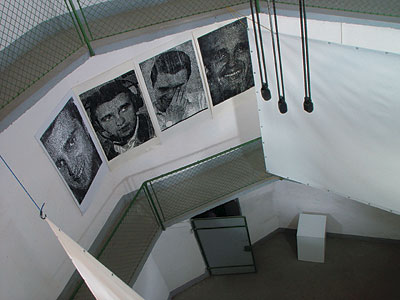
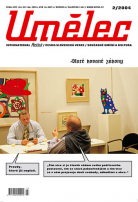


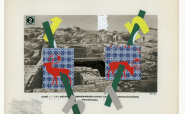
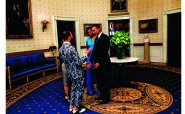
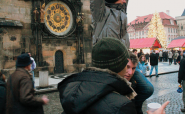
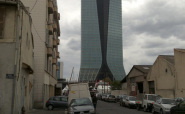
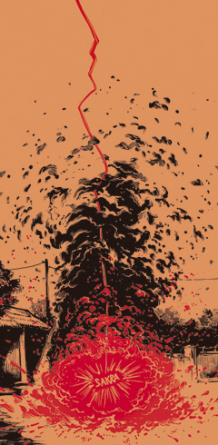






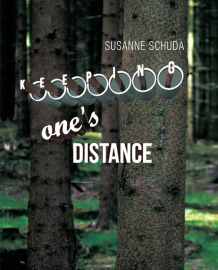




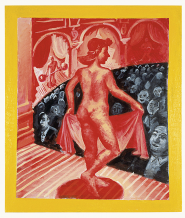
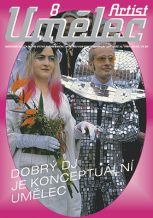
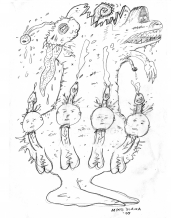
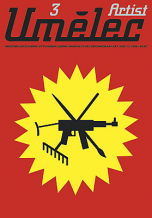


 Potsdamer Str. 161 | Neu Divus in Zwitschermaschine, galerie und buchhandlug in Berlin! | Mit U2 nach Bülowstraße
Potsdamer Str. 161 | Neu Divus in Zwitschermaschine, galerie und buchhandlug in Berlin! | Mit U2 nach Bülowstraße
Kommentar
Der Artikel ist bisher nicht kommentiert wordenNeuen Kommentar einfügen